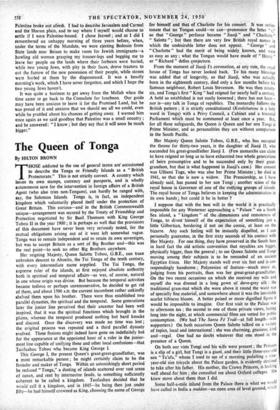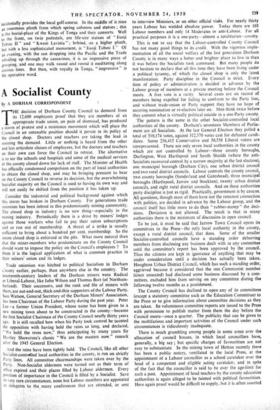The Queen of Tonga
By HILTON BROWN
Her reigning Majesty, Queen Salotte Tubou, G.B.E., can trace unbroken descent to Ahoeitu, the Tui Tonga of the tenth century, with every intermediate name. supplied. The Tui Tonga, the supreme ruler of the islands, at first enjoyed absolute authority both in spiritual and temporal affairs—as was, of course, natural in one whose origin was divine. But because the temporal activities became tedious or perhaps unremunerative, he decided to get rid of them, and about 1500 A.D: the current incumbent rather unkindly shelved them upon his brother. There were thus established two parallel dynasties, the spiritual and the temporal. Some generations later the junior line perceived that their ancestor had been well inspired, that it was the spiritual functions which brought in the plums, whereas the temporal produced nothing but hard knocks and discord. Once the discovery was made no time was lost ; the original process was repeated and a third parallel dynasty evolved. These fissions might indeed have gone on indefinitely but for the appearance at the appointed hour of a ruler in the junior- most line capable of unifying these and other local confusions—that Taufaahau Tubou who became King George I.
This George I, the present Queen's great-great-grandfather, was a most remarkable person ; he might certainly claim to be the founder and maker of Tonga. Within an astonishingly short period he reduced "Tonga," a dusting of islands scattered over vast areas of ocean, and rent by internecine feuds, to something sufficiently coherent to be called a kingdom. Taufaahau decided that he would call it a kingdom, and in 1845—he being then just under fifty—he had himself crowned as King, choosing the name of George for himself and that of Charlotte for his consort. It was unfor- tunate that no Tongan could—or can—pronounce the letter "r," so that " George " perforce became " Jiaoji " and " Charlotte " " Salotte " ; but then there are very few British royal names in which the undesirable letter does not appear. " George " and " Charlotte " had the merit of being widely, known, and were as easy as any ; what the Tongan would have made of " Henry " or " Richard " defies conjecture.
From the moment of Jiaoji l's coronation, at any rate, the royal house of Tonga has never looked back. To his many blessings was added that of longevity, so that Jiaoji, who was actually born in the eighteenth century, died only a few months before his Samoan neighbour, Robert Louis Stevenson. He was then ninety- six, and Tonga's first " King " had reigned for nearly half a century. A hold so established is not easily loosened ; there has not been— nor is—any talk in Tonga of republics. The monarchy follows the British pattern ; it is strictly constitutional (Konisitutone is a holy word in Tonga) with a Privy Council, a Cabinet and a triennial Parliament which must be summoned at least once a year. But, for all these safeguards, the Queen is Queen and her son Tungi is Prime Minister, and as personalities they are without comparison in the South Pacific.
Her Majesty Queen Salotte Tubou, G.B.E., who has occupied the throne for thirty-two years, is the daughter of Jiaoji II, who succeeded his great-grandfather Jiaoji I. (Few monarchs can claim to have reigned so long as to have exhausted two whole generations of heirs presumptive and to be succeeded only by their great- grandson, but that is what happened in Jiaoji's case.) Her consort was Ulliami Tuge, who was also her Prime Minister ; he died in 1941, so that she is now a widow. The Premiership, as I have already said, has passed to her son Tungi ; another scion of the royal house is Governor of one of the outlying groups of islands. The royal house of Tonga believes in keeping the administration in its own hands ; but could it be in better ?
I suppose that with the best will in the world it is practically impossible for any Westerner approaching a " Palace " on a South Sea island, a " kingdom " of the dimensions and remoteness of Tonga, to divest • himself of the expectation of something just a little .Gilbertian, bordering if not on the comic, at least on the bizarre. Any such feeling will be instantly dispelled, as I can personally guarantee, in the first sixty seconds of his contact with Her Majesty. For one thing, they have preserved in the South Seas in hard fact the old artistic convention that royalties .are bigger, physically bigger, than the general ; to see Queen Salotte and Tungi moving among their subjects is to be reminded of an ancient Egyptian frieze. Her Majesty stands well over six feet and is cor- respondingly handsome ; Polynesian of feature—much more so, judging from his portraits, than was her great-great-grandfather. On the two recent occasions on which she received My wife and myself she was dressed in a long gown of dove-grey silk ; the traditional grass-mat which she wore above it round. the waist was of specially fine material, and somewhere about it was the inevitable scarlet hibiscus bloom. A better poised or more dignified figure it would be impossible to imagine. Our first visit to the Palace was to afternoon tea ; the second to one of those private views, lasting long into the night, at which commercial films are vetted for public consumption. (We had The Santa Fe Trail—at full length—with supporters.) On both occasions Queen Salotte talked on a variety of topics, local and international ; she was charming, gracious, kind and—regal. One had no doubt whatever that one stood in the presence of a Queen.
On both our vists Tungi and his wife were present ; the Princess is a slip of a girl, but Tungi is a giant, and their little three-year-old son " Ta'afa," whom I used to see of a morning pedalling a nine- year-old size tricycle about the Palace garden, is evidently destined to take after his father. His mother, the Crown Princess, is looking well ahead .for him ; she consulted me about Oxford colleges. Shg knew more about them than I did.
Some half-a-mile inland from the Palace there is what we would have called in India a maidan—an open area Of level ground, v,hich incidentally provides the local golf-course. In the middle of it rises an enormous plinth from which spring columns and statues ; this is the burial-place of the Kings of Tonga and their cpnsorts. Well to the front, on twin pedestals, are life-size statues of " Jiaoji Tubou II" and " Kweni Lavinia " ; behind, on a higher plinth, but with a less sophisticated monument, is " Jiaoji Tuboii I." Of an evening, with the sun dropping into the Pacific and the Trade whistling up through the casuarinas,_ it is an impressive piece of grouping, and one may walk round and round it meditating along curious lines. But then, with royalty in Tonga, " impressive " is the operative word.















































































 Previous page
Previous page